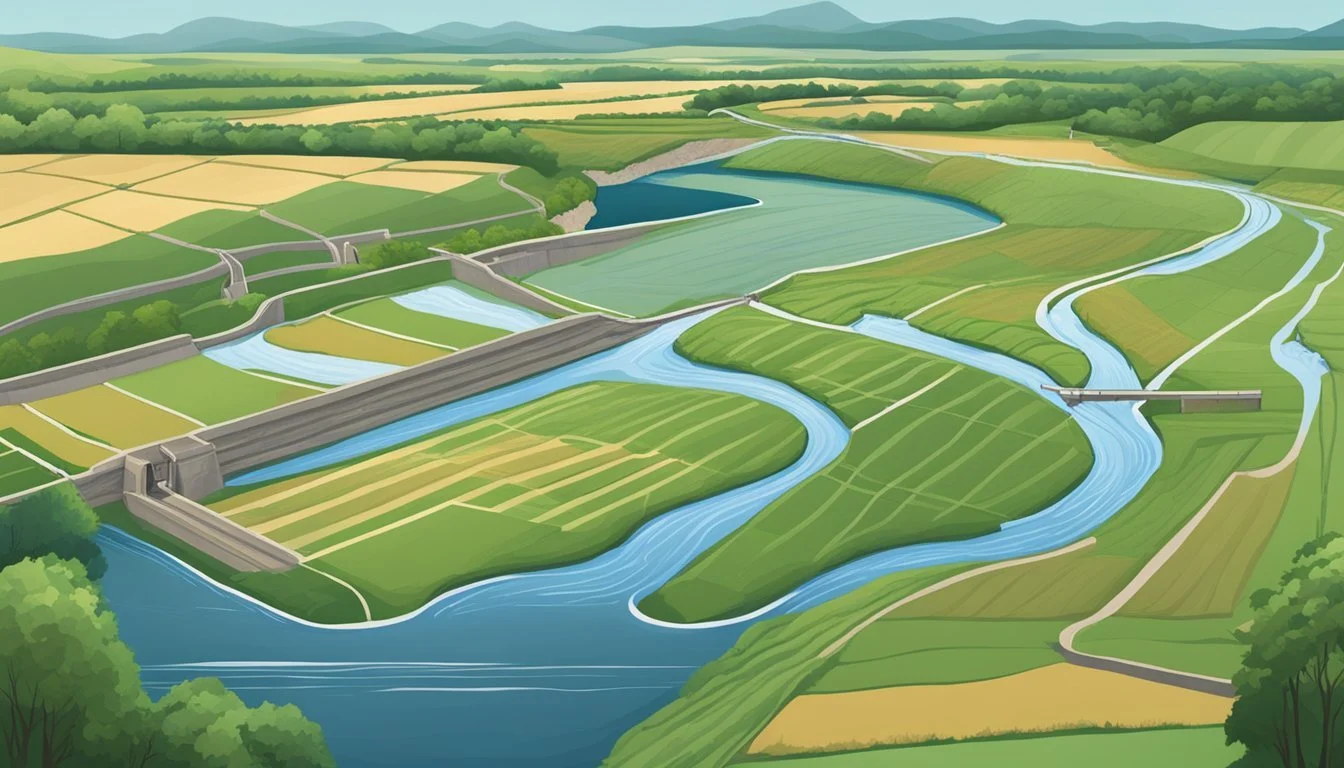Water Rights in Arkansas
Navigating Legal and Environmental Challenges
In the state of Arkansas, water rights are subject to a "regulated riparian" model. This framework blends traditional riparian principles with a dynamic system of supervision, administrative protocols, and legal regulations. Arkansas’ approach to water rights has been shaped by evolving needs and historical contexts, starting to take its current form in the late 1950s. Under this system, landowners whose property adjoins bodies of water have the right to make reasonable use of it, which is a tenet characteristic of riparian rights.
The particularities of water law in Arkansas involve both the natural flow theory and the reasonable use theory, ensuring that water resources are shared fairly and responsibly among those with legal access to it. For a landowner, having water adjacent to or flowing through their property is inherently tied to their property rights, yet it's balanced by the state's power to oversee and regulate usage to preserve the resource for the common good.
Furthermore, unlike some western states in the US, Arkansas imposes no restrictions on the collection of rainwater, allowing residents to harness what falls on their property for various uses, including irrigation and conservation. This indicates the state's recognition of the importance of sustainable practices in managing and utilizing water resources.
Arkansas Water Law Overview
In Arkansas, the management and allocation of water resources is governed by a combination of historical principles and current legislative frameworks. Understanding these laws is essential for stakeholders ranging from individual landowners to large industries.
Historical Development
Arkansas water law has evolved from a mix of common law principles, notably the riparian doctrine, which originated in English law. This doctrine grants individuals whose property abuts a watercourse the right to make reasonable use of the water. Arkansas has also integrated aspects of the prior appropriation system, more common in the western United States, which differs from riparian rights by allowing water use based on a priority system, often independent of land ownership.
Legal Frameworks
Today, the Arkansas General Assembly and various state agencies shape water law through legislation and regulations that reflect both riparian rights and prior appropriation ideologies. The Arkansas Administrative Procedure Act plays a key role in guiding administrative agencies in the creation and enforcement of water laws. These laws broadly aim to support beneficial use, dictated by multiple criteria, including, but not limited to, domestic use, agricultural irrigation, and industrial applications.
Key Water Law Terms
Essential terminology within the context of Arkansas water law includes:
Beneficial Use: Utilization of water that is both reasonable and efficient.
Acre-foot: A measurement unit representing the volume of water required to cover one acre of land to a depth of one foot, equivalent to 325,851 gallons.
Domestic Use: Water used for personal needs such as drinking, bathing, and household purposes.
Reasonable Use: A standard in riparian doctrines which mandates that a riparian owner's use of water must not unduly interfere with other riparian owners' rights.
State Water Resources Management
The Arkansas Natural Resources Commission (ANRC) serves as the primary entity for water resources management in the state, ensuring the development, conservation, and protection of Arkansas's water. They implement comprehensive plans emphasizing sustainability and water conservation practices.
Arkansas Natural Resources Commission
The ANRC operates as the key regulatory agency tasked with overseeing the use and management of water resources in Arkansas. They manage the state's natural resources, focusing on ensuring that water is used efficiently and responsibly to meet the needs of both current and future generations.
Water Management Plans
As part of its mandate, the ANRC has developed the Arkansas Water Plan, which acts as a strategic framework for long-term water management. This dynamic document addresses the balance between water demands and supplies and lays out potential solutions and practices aimed at the reduction of water waste and enhancement of conservation efforts.
Water Conservation Strategies
Arkansas has adopted a variety of water conservation strategies to promote sustainable use of water resources. These practices include regulatory programs that encourage responsible water management and the adoption of water-saving techniques among industries, agriculture, and communities. The goal is to achieve significant reduction in water use, ensuring sustainability for the environment and the state's diverse water needs.
Water Use and Allocation
In Arkansas, the management of water resources is critical due to its various uses ranging from agricultural irrigation to industrial processes. It encompasses both surface and groundwater with a regulatory framework to ensure equitable distribution and sustainable use.
Surface Water Use
Arkansas recognizes the importance of surface water for its economy and ecology, with policies in place for the allocation and development of water resources. Surface waters include lakes, rivers, and navigable waterways, which are subject to rights and usage regulations to maintain a minimum stream flow. These regulations protect not only the water supply but also the habitats dependent on these water bodies.
Ground Water Use
Groundwater, primarily sourced from aquifers, is a significant component of Arkansas's water resource management. The state identifies certain regions as critical groundwater areas due to the high demand on the groundwater supply there, leading to stringent controls over extraction to prevent depletion.
Permitting Process
The permitting process is a key element that controls water allocation in Arkansas. Individuals and entities must obtain permits to legally extract and use water. These permits are granted considering public interest and ecological sustainability. The condition and availability of water resources are critical factors in the decision-making process for granting permits.
Rights and Restrictions
Water rights in Arkansas involve a set of restrictions and limitations to balance use and conservation. These rights define the relationship between water use and the welfare of the community, establishing frameworks for intrabasin transfer and outlining the responsibilities of the permittee. They ensure that water usage remains within the bounds of what is beneficial to both the environment and public interests.
Water Quality and Environmental Concerns
The state of Arkansas recognizes the critical importance of maintaining high water quality standards and ensuring the health of its natural resources. Effective water pollution control and extensive federal and state environmental projects play a pivotal role in conservation efforts and provision of clean water to its citizens.
Water Pollution Control
Arkansas has established strict guidelines and measures to manage water pollution and ensure the integrity of its waterways. A key player in this initiative, the Arkansas Department of Environmental Quality (ADEQ), develops biennial reports known as the 303(d) list, identifying water bodies that do not meet specific water quality standards needed to support their designated uses, including maintaining healthy fish populations and suitable conditions for recreation. The ADEQ's role extends to overseeing sanitation services and working closely with conservation districts to mitigate pollution and safeguard Arkansas's water resources.
Federal and State Environmental Projects
The federal government, through Biden's Bipartisan Infrastructure Law, is setting aside substantial funding to improve water systems across the country, with Arkansas poised to benefit significantly. This investment is expected to enhance clean water accessibility and bolster the state's water infrastructure. Additionally, Arkansas's governor has directed the updating of the state's water plan, which will influence a series of policy decisions centered on flood management, drinking water quality, and agricultural irrigation, reflecting a holistic approach to water resource management and environmental stewardship.
Agricultural Impacts on Water Rights
The relationship between agriculture and water rights in Arkansas is shaped by the demands of irrigation and the necessity for conservation to ensure sustainability.
Irrigation and Agriculture
Irrigation is critical for Arkansas's agricultural sector, as it supports the cultivation of crops essential to the state's economy and food supply. Arkansas sees substantial water use for irrigation purposes, making the management of water rights particularly important for farmers. Legislations and guidelines from entities like the Arkansas Natural Resources Commission play a crucial role in allocating water resources to ensure that water shortages do not disrupt agricultural productivity.
Crops: The primary consumers of irrigated water.
Irrigation Methods: Includes surface and sprinkler irrigation systems.
Balancing Agriculture with Conservation
The balance of agriculture with water conservation efforts in Arkansas is essential for long-term sustainability. Sustainable water practices are gaining traction, promoting the economic benefit of communities while protecting the environment. The Arkansas Water Primer Series highlights the importance of responsible water management in supporting both agricultural needs and conservation goals.
Conservation Techniques: Use of drip irrigation and scheduling.
Legislation: Enforces the fair distribution and responsible usage of water resources.
Legal Issues and Dispute Resolution
In Arkansas, the legal framework governing water rights can lead to complex litigation and necessitates mechanisms for dispute resolution. The state applies a regulated riparian system, where traditional principles interweave with administrative oversight. Legal issues often emerge from the allocation of these water resources, which may involve individuals, entities, and even neighboring states.
Water Rights Litigation
When conflicts over water rights arise in Arkansas, they are often adjudicated in the state’s courts. Individuals or entities claiming a right to water based on their property’s proximity to a water source can find themselves in litigation to defend or challenge these rights. The courts assess these disputes by considering both the established law and precedents from Arkansas as well as those from other jurisdictions. A key case that has influenced water rights litigation is Thomas v. LaCotts, which established that riparian rights are inherent to the property and do not depend on actual water use.
Interstate Water Compacts
Arkansas is a party to agreements like the Arkansas River Compact and the Red River Compact which govern water allocation among states. As these compacts are federal law, they preempt state law to ensure an equitable distribution of interstate waters. Any conflicts arising from these agreements might escalate from state-level discourse to federal arbitration or litigation, highlighting the importance of collaborative interstate water management. These compacts also delineate protocols for dispute resolution, emphasizing cooperative approaches prior to engaging in costly litigation.
Roles and Responsibilities
In Arkansas, managing water resources is a collaborative effort involving various stakeholders and state agencies. Each entity carries distinct roles and coordinated responsibilities in upholding water rights and resource management.
Stakeholder Involvement
Stakeholders such as local governments, individuals, and businesses are essential in water rights management in Arkansas. They must comply with water regulations and participate in water conservation efforts. Attorneys play a role in navigating the complexities of water law, ensuring that stakeholders adhere to their legal obligations and rights.
State Agency Coordination
The State of Arkansas is pivotal in regulating water resources, with state agencies such as the Arkansas Department of Agriculture and the Arkansas Natural Resources Commission working in tandem to safeguard and manage water use. These agencies enact policies set forth by the legislature and are supervised by a director or district officials who are responsible for monitoring and enforcing water allocation and usage. State agencies coordinate with one another to implement comprehensive water plans and address statewide water needs.
Water Rights Termination and Transfer
Managing water resources necessitates a structured approach to both the termination and transfer of water rights. These legal processes are vital in ensuring the equitable distribution and responsible use of water, particularly in relation to the allocation of surface water and the operations of regional water districts.
Water Rights Termination
Water rights in Arkansas may be terminated under specific conditions, such as the prolonged non-use of water or through legal revocation. The regulated riparian system in the state incorporates traditional principles and enforces water diversion in a manner that maintains equilibrium within the ecosystem. Termination might occur if a water user significantly alters the watercourse without appropriate authorization, or fails to adhere to the established regulations by a regional water district.
Water Rights Transfer
Transferring water rights in Arkansas is controlled by statutes and involves notifying the Arkansas Natural Resources Commission. A water right is inherently tied to the land and can only be transferred along with the property it pertains to, ensuring the rights are automatically transferred with surface ownership. This means that water rights cannot be sold or transferred separately from the land itself, thus upholding the integrity of surface water allocation across different landowners.
Public Interest and Water Rights
In Arkansas, water rights hinge on a delicate balance between individual entitlements and public interest. Public interest includes a variety of factors such as ecological sustainability, economic development, and ensuring safe water for all.
Ecological Sustainability: Protecting Arkansas's water resources is critical for maintaining biodiversity and ecological systems. The state's water laws recognize the importance of preserving water for fish and wildlife habitats.
Economic Development: Water is a cornerstone for Arkansas's agricultural and industrial sectors. As such, water rights are regulated to support these economic activities while safeguarding against overuse and depletion.
Public Safety: Clean water is essential for public health. Regulations are in place to prevent pollution and to secure access to potable water for all communities.
The state's approach is sometimes described as a hybrid legal system that combines elements of riparian rights with prior appropriation. Under this system, property owners may use adjacent watercourses, but their rights are subject to reasonable use and cannot harm public interest. Arkansas Water Law has evolved to address the complexity of managing a finite and vital resource, reflecting an understanding that water rights are not absolute but are limited by the overarching need to serve the common good.
Arkansas also actively seeks federal support to improve its water systems. Beyond state-specific regulations, federal legislation plays a part in shaping policies that serve the public interest in Arkansas. Recent initiatives include investing federal funds to enhance the state's water infrastructure, thereby reinforcing commitments to public safety and economic growth. Improving Arkansas Water Systems is an example where such funds are allocated to serve the broader community needs.
Economic Aspects of Water Resources
In Arkansas, water resources significantly contribute to its economy. The utilization of water spans across various sectors, including agriculture, industry, and recreation. Within agriculture alone, water enables the cultivation of crops and sustenance of livestock, which are cornerstones of Arkansas's economy.
Revenue from water resources is generated through multiple channels. The state imposes certain fees for water usage permits and licenses necessary for individuals and businesses to withdraw or divert water. These fees contribute to governmental funds, which further support water management and conservation programs.
Moreover, the industrial sector relies on water for manufacturing processes, waste management, and other operations. The availability and quality of water resource are therefore key factors in maintaining economic stability and attracting new industries to the region.
Recreational activities such as fishing, boating, and waterfront tourism also add economic value. These draw visitors, creating demand for services and businesses, which translates to a considerable stream of revenue for local communities.
Direct Economic Benefits: Sales and employment generated by water-dependent industries, agriculture, and recreation.
Indirect Economic Benefits: Enhanced property values and ancillary services fueled by water-based activities.
Arkansas's water laws, as outlined in detailed documents from the Arkansas Water Primer Series and the Arkansas Department of Agriculture, reflect the importance of responsible water management to protect these economic interests.
The economic influence of water resources in Arkansas is clear, interlacing with the vitality and growth of various sectors, reinforcing the need for balanced and sustainable water rights and management practices.
Emerging Issues in Water Rights
Arkansas faces several emerging issues concerning water rights that are shaping the state's legal and environmental landscape. As water is critical for both human consumption and economic activities, the balance between usage and sustainability is necessitating new policies and investments.
Deteriorating Infrastructure: Aging water systems pose a risk to supply reliability and quality. The federal funds allocated for infrastructure improvements reflect the urgency of modernizing these systems.
Groundwater Depletion: Over-extraction of groundwater for agricultural and industrial purposes is leading to declines in water levels, prompting reviews of policies for sustainable use. An updated plan for water policy is in progress to address such concerns.
Riparian Rights: In the context of riparian reasonable use, conflicts arise when usage by one party negatively impacts others. The balance of these interests is a topic of ongoing legal clarification, as documented in the Arkansas Water Primer Series.
Federal Investments: The Biden-Harris Administration's investment in Arkansas's water systems underscores the nationwide trend to prioritize water rights and access. Proactive measures are being taken to ensure the availability of clean water, highlighted by the EPA's recent funding announcement for Arkansas drinking water upgrades.
These issues collectively represent the dynamic nature of water rights in Arkansas. Stakeholders including government agencies, environmental groups, and citizens are actively involved in the discourse to navigate these emerging challenges and secure water rights for future generations.
Frequently Asked Questions
Water rights in Arkansas involve a complex set of laws and regulations. This section explores common inquiries about water usage and rights within the state.
How do riparian rights function within the state of Arkansas?
In Arkansas, riparian rights allow landowners with properties adjoining a body of water to use that water in a reasonable manner as long as it does not adversely affect downstream users. These rights are inherent to the ownership of the waterfront land.
Can property owners use adjacent water bodies freely in Arkansas?
Property owners in Arkansas can use water from adjacent bodies subject to the riparian principle of reasonable use. This means their usage should not interfere substantially with the rights of other landowners or the public interest.
What regulations govern the use of groundwater in Arkansas?
Groundwater use in Arkansas is regulated by the Arkansas Natural Resources Commission, which requires permits for withdrawal to ensure sustainable usage and prevent negative impacts on the aquifer system.
Are there any restrictions on diverting water from rivers for landowners?
Yes, landowners in Arkansas must comply with specific regulations of dams to ensure minimum streamflow and safe operation, and they are subject to allocation during shortages, reflecting a balance between landowner rights and public welfare.
How does the Arkansas Natural Resources Commission impact water usage?
The Arkansas Natural Resources Commission serves as the primary state agency for water resources planning and management, which includes allocating water rights, ensuring water quality, and planning for future water needs of the state.
What legal framework addresses the use of water for agricultural purposes in Arkansas?
For agricultural water usage, Arkansas law provides a framework for both the allocation of water rights and the construction and operation of facilities such as irrigation systems, balancing the needs of agricultural users with environmental and public interest concerns.











